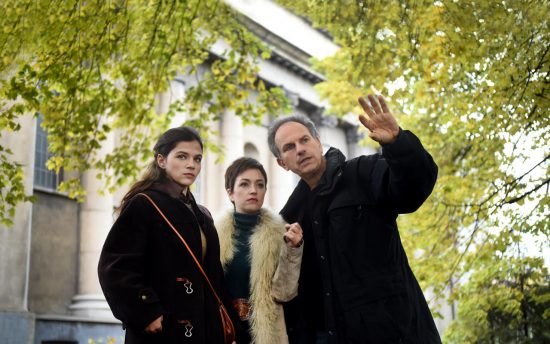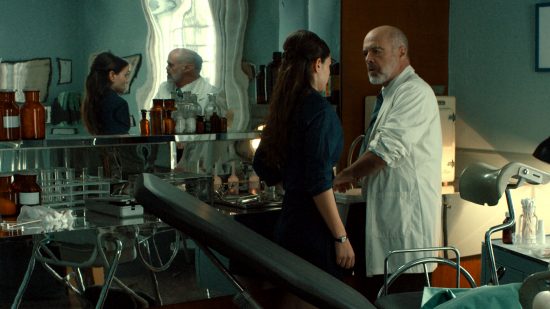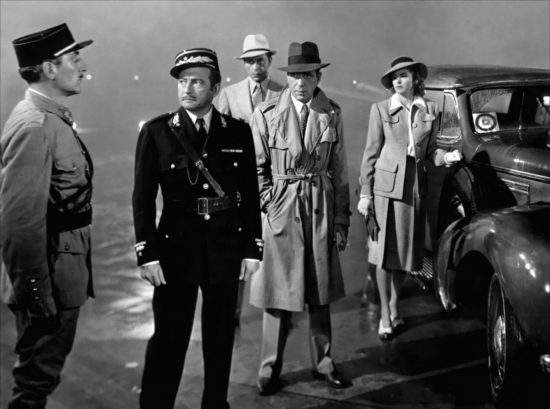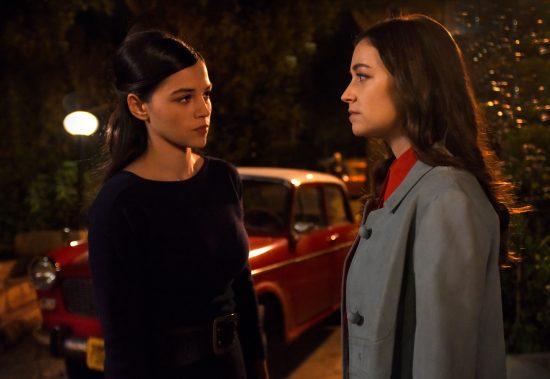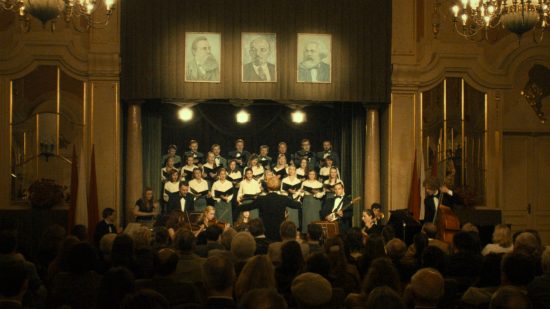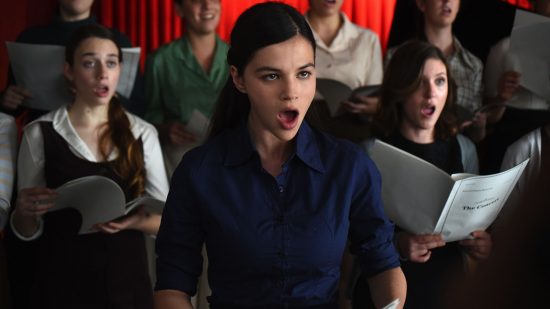Weight of History: Avi Nesher talks about Past Life
Trevor Hogg talks to Avi Nesher about dealing with trauma, the need for breaking free of the past to have a future, and the making of Past Life…
An interest in international relations led Avi Nesher to study the subject at Columbia University but what really fascinated him at the time was the idea of making movies. “When I was going to Columbia there was no bachelor’s degree in film so my major was International Relations.” An influential professor for the undergrad student was Andrew Sarris who taught courses in international film history, American cinema and Alfred Hitchcock along with being a famous film critic known for popularizing the auteur theory. “He let me take as many master classes as I wanted to. For me, my interest in film and international relations was always parallel. I wanted to make movies about the way people got together.” The ambition became a reality when native of Ramat Gan, Israel produced and directed his first film The Band in 1978 and he has maintained a presence in cinema ever since receiving Lifetime Achievement Awards from the Israeli Film Festival in 2007 and Washington Jewish Film Festival and 2010. The ramifications of the Holocaust on the children of the survivors serves is central theme of Past Life, the 18th feature by Nesher which revolves around two sisters in the 1970s trying to uncover whether their father committed murder during World War II.
Past Life has no pro-Israel agenda as an activist daughter portrayed by Nelly Tagar is openly critical of Israeli policies. “Movies are made to stir things up and to raise questions,” believes Avi Nesher. “There has been so many years since the end of World War II and the world has moved on but we haven’t. Israel is a country living under the trauma of the Holocaust. Much of the world doesn’t understand it. People don’t get a country that expects to be destroyed tomorrow. There’s a man sitting in Tehran saying this is his plan. A lot of Israeli politics and the ways Israelis conduct themselves are based on this assumption which is no way to live one’s life. One needs to get past it in order to have a future. The whole contention of this movie is that you can’t understand the present if you don’t deal with the past.” Nesher adds, “You deal with the weight of the past by embracing it and understanding that there will be no justice. You have two sisters born to parents who had a severe trauma and the trauma had been passed on to the second generation which is my generation. Now my kids are getting the trauma from me. This trauma will go on and on unless someone says, to quote the wise Donna Summer, ‘Enough is enough.’”
“I’m a great believer in making movies that are based on fact,” reveals Avi Nesher. Some stories are preposterous and lurid but when based on reality they become powerful. The woman who is Sephi Milch [Joy Rieger] told me the story. This is pretty much the way things happened and the father character is based on her father’s diary which is in print. We know about the crimes of the Nazis, there’s nothing new to say about that but reality has many colours and shades, and nothing is as simple as we think it is. One has to look at reality closer and figure out those different shadings because we base our life on mythology not history.” Movies can have social commentary and be entertaining. “Casablanca relentlessly attacks America for not being involved in World War II and it’s the consummate entertainment. Robert Altman’s ability to laugh at the military in MASH did more damage than many anti-war marches.”
A painterly approach was adopted for the imagery of Past Life. “We spent a lot of time literally on every shot with the light, colour and subtext,” explains Avi Nesher. “I used to be a Jazz musician and believe that the making of a movie is the coming together of a few good men and women. I work with the production designer, wardrobe designer, DP, and the composer. They’re involved even at the screenplay stage. I go to great lengths of letting everybody express their own artistry in the movie.” Crane and tracking shots are incorporated into scenes. “I hate haphazard cinema. Lets just shoot it and make it work in editing. That bores me. I am a big admirer of fluent cinematic language. If you see North by Northwest you can see every scene a hundred times and be bewildered by the sheer beauty of the language. The same way you would bewildered by a Walt Whitman poem. I rehearse for weeks and let every actor have their own input into the character. I rewrite almost on a daily basis to a point where the actor becomes the character and the character becomes the actor.”
Pivotal to the success of Past Life was the casting of Nelly Tagar and Joy Rieger. “It was difficult because they are the heart and soul of the movie,” notes Avi Nesher. “We had to have two actresses that felt like sisters and looked the part. The younger one needed to be able to sing as well. Talk about stacking the deck. It took us a year. When we tested Nelly and Joy together it was extraordinary. Joy acted in two of my daughter’s shorts. You can look forever in a day and then ask your daughter, ‘Can you think of anyone, honey?’ She goes, ‘There’s this actress in my shorts.’ That’s how it works!” It was not so hard to find locations in Poland that looked like they were from the 1970s. “Israel has changed considerably over the last 40 years so it was difficult to find authentic locations. The house where the Milch family live is a set that we had to create.”
“The movie is about music in so many ways,” states Avi Nesher. “Sephi Milch is a composer. We spent a great deal of time coming up with the pieces that would be played in the movie. Two choir pieces were written originally for the movie. The one played in Poland was written by Avner Dorman while Sephi’s piece was composed by the woman who told me the story, Ella Milch-Sheriff. French composer Cyrille Aufort did the score.” The sound design took on a symbolic tone. “I had in mind sounds that did not exist in the visuals. Israelis are haunted by the sound of trains. We have trains throughout but there isn’t a single shot of one in a movie.
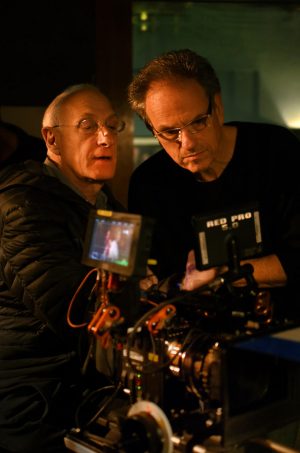
Michel Abramowicz and Avi Nesher on-set.
“Past Life was shot by Michel Abramowicz who is a French DP,” states Avi Nesher. “This was my fourth time of working with him. Everything was worked out precisely. Hitchcock once said, ‘If you do your work properly the making of the movie becomes an afterthought. If you spend a lot of time during prep working out everything when the clock is not ticking you have time to think clearly and time to make mistakes and fix them. Then you go out and shoot it properly. Chances are there will be much coherence in the visual style, to the sound design and narrative flow of the movie.” The time spent in Poland was extraordinary. “It was one of the greatest experiences in my life working with people who have collaborated with Andrzej Wajda and Jerzy Skolimowski.” Financing the project was an issue. “The challenge as always was that the vision is much greater than the budget. For me a ticket to my movie costs the same as a $200 million American movie so you must have a visceral and emotional experience. The word art doesn’t justify boredom.”
Avi Nesher admires Israeli filmmakers Talya Lavie (Zero Motivation) and Joseph Cedar (Footnote). “Israel has a vibrant filmmaking community and culture. You have a completely freehand in making a movie. If the movie is not good it’s only your fault.” Past Life is meant to be seen on the big screen. “I’ve been to some screenings and a lot of people start crying halfway through and don’t stop until the end. For me cinema has to be like a concert. You have to be there and experience it with other people.” Nesher is currently working on Valley of Ghosts. “Jerusalem is my next great trauma. The Holocaust hangs over the Israeli subconscious and Jerusalem hangs over the whole Middle East. There are four different religions and each one needs to kill you because you are wrong and they are right. Jerusalem for me is one of the most wonderful and scariest places like Nicolas Roeg used Venice in Don’t Look Now. I love making movies where the city is a character onto itself the way that Woody Allen does with Manhattan.”
Many thanks to Avi Nesher for taking the time to be interviewed and to learn more visit the official site for Past Life.
Trevor Hogg is a freelance video editor and writer who currently resides in Canada; he can be found at LinkedIn.
Next PostPrevious Post(adsbygoogle = window.adsbygoogle || []).push({});


